Differences in Colorectal Cancer Risk Knowledge Among Alabamians: Screening Implications
Purpose/Objectives: To explore differences in cancer risk knowledge and colorectal cancer (CRC) knowledge among adults in Alabama.
Research Approach: Telephone interviews were conducted using an 80-item questionnaire that included 14 demographic questions and 26 general questions regarding healthcare quality, sources of health-related information, and cancer fears and risk factors. Also included were 40 questions dealing with CRC perceptions and experiences (asked only of respondents aged 50 years or older).
Setting: A standard random-digit–dialed statewide telephone survey, targeting adult residents of Alabama. Interviews were conducted during about seven weeks in 2012.
Participants: 1,024 participants, including 615 who were aged 50 years or older. Most of the participants identified as Caucasian.
Methodologic Approach: A secondary data analysis using data from a CRC screening survey of Alabama residents conducted in 2012 by the University of South Alabama polling group via telephone.
Findings: Knowledge of general cancer risk factors predicted disagreement with the statement, “There is nothing you can do to avoid getting cancer,” and disagreement with the statement, “Only people with signs or symptoms should be screened for CRC.” Binary logistic regression showed that those higher in CRC risk knowledge were more likely to have been screened for CRC.
Conclusions: Knowledge of general cancer risk factors may increase self-efficacy. In addition, individuals with increased knowledge of colorectal cancer risk factors were more likely to participate in CRC screening.
Interpretation: Nurses play an instrumental role in addressing CRC, a preventable and treatable cancer. An opportunity exists for nurses and other healthcare providers to develop culturally appropriate educational interventions to increase knowledge related to CRC, risk factors, and screening, particularly among those who are at increased risk. This education needs to occur in clinical practice and within the community.
Jump to a section
Colorectal cancer (CRC) is a leading cause of cancer mortality and morbidity in the United States. It is the second leading cause of cancer death and the third most common cancer diagnosed in men and women (American Cancer Society [ACS], 2015a). Several risk factors for CRC are considered to be nonmodifiable, such as age, gastrointestinal disorders, and family history. Age is the primary risk factor for CRC, with 90% of cases occurring in those aged 50 years or older. Certain gastrointestinal disorders—including inflammatory bowel disease, Crohn’s disease, and ulcerative colitis, as well as familial adenomatous polyposis and Lynch syndrome (also known as hereditary nonpolyposis CRC, Lynch syndrome is an autosomal dominant hereditary disease process)—can increase an individual’s risk of cancer, specifically CRC (ACS, 2015b; Hampel et al., 2008). Personal or family history of CRC or colorectal polyps is also a risk factor. Aside from these risks, numerous modifiable risk factors also increase CRC risk, including lack of regular physical activity, low fruit and vegetable intake, a low-fiber and high-fat diet, obesity, alcohol consumption, and tobacco use (ACS, 2015b; Chan & Giovannucci, 2010; Ferrari et al., 2007; World Health Organization, 2008).
The U.S. Preventive Services Task Force (2015) recommends, for men and women at average risk for cancer, beginning at age 50 years (a) an annual high-sensitivity (HS) blood stool test, (b) a sigmoidoscopy every five years with a HS blood stool test every three years, or (c) a colonoscopy every 10 years. Positive stool test or sigmoidoscopy results must be followed by a diagnostic colonoscopy. CRC screening may stop at age 75 years (U.S. Preventive Services Task Force, 2015). The ACS (2015b) recommendations for CRC screening are similar: Routine screening for average-risk adults begins at age 50 years, but no age recommendations exist regarding stoppage of CRC screening. Although the colonoscopy and the fecal immunochemical test (FIT) are screening modalities, the American College of Gastroenterology (2015) recommends the colonoscopy as the preferred CRC prevention test by finding and removing polyps and the FIT as the preferred cancer detection test (Rex et al., 2009). However, not all individuals take advantage of these known methods of screening for CRC, and disparities in cancer screening continue to exist. Results of 2010 survey data from the Behavioral Risk Factor Surveillance System (BRFSS) analyzed by the Centers for Disease Control and Prevention ([CDC], 2014) indicate that about 65% of respondents aged 50–75 years were up to date with CRC screening. Non-Hispanic Caucasian participants had the highest screening rate at 66%. The rate of CRC screening for non-Hispanic African American participants was 65% (Steele, Rim, Joseph, King, & Seeff, 2013).
A number of barriers and facilitators to CRC screening were identified in the literature (see Table 1). In a qualitative study exploring barriers and facilitators to CRC screening that included 14 participants, physician recommendations and increasing knowledge of CRC and CRC risk were found to be important facilitators, whereas lack of information about CRC and CRC screening, as well as lack of access to care, were identified by the participants as barriers to screening (Griffith, Passmore, Smith, & Wenzel, 2012). Among a sample of Medicare consumers (N = 1,901), which included about 79% non-Hispanic Caucasian participants and 21% African American participants, 594 participants reported never being tested for CRC. Of those who reported never having been screened, a majority reported having no knowledge of screening options, and only 7% reported receiving a recommendation from their physician. A physician recommendation was identified as a key component of all of the Medicare consumers (98% or greater) who received CRC screening (Klabunde, Schenck, & Davis, 2006).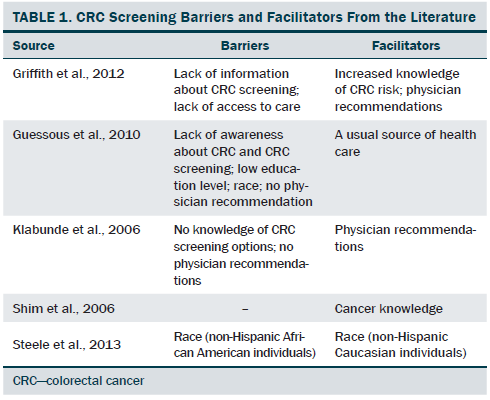
Lack of awareness about CRC and CRC screening, lower education level, and race were identified as barriers to CRC screening by Guessous et al. (2010) in a systematic review focusing on CRC screening barriers and facilitators in older adults. Eighty-three studies were included in the review. Specifically, Guessous et al. (2010) reported that having a belief related to “CRC screening not being necessary,” living in an area with low education, having less than a high school education, and being African American or Hispanic were frequently reported as barriers to CRC screening. Another highly cited barrier identified was lack of CRC screening recommendation by a physician. However, a common CRC screening facilitator was having a usual source of care (Guessous et al., 2010, p. 5). One aspect that may increase the probability of getting screened for CRC is cancer knowledge and beliefs. In a study that included 71% (n = 4,521) non-Hispanic Caucasian participants, 12% (n = 764) non-Hispanic African American participants, and 13% (n = 827) Hispanic participants, those who paid attention to health or medical topics and collected knowledge about cancer were more likely to receive CRC and prostate cancer screening (Shim, Kelly, & Hornik, 2006).
Proper screening makes CRC highly treatable and often preventable by finding and removing polyps before they become cancer. However, according to the 2013 BRFSS data, only about 68% of Alabamians are up to date on CRC screening. Screening was operationally defined as a blood stool test within one year, or a sigmoidoscopy within five years and a blood stool test within three years, or a colonoscopy within 10 years (CDC, 2014). Alabama’s screening rate remains lower than the Healthy People 2020 target of 71%. Education, along with the use and availability of health care, are positively associated with higher screening rates (CDC, 2012).
The Alabama Department of Public Health and the Alabama Comprehensive Cancer Control Coalition ([ACCCC], 2010), along with other partners in the state in conjunction with the National Colorectal Cancer Roundtable, the ACS, and the CDC, have set a goal to achieve a screening rate of 80% by 2018 among those who are aged 50 years or older. In Alabama, African American women report the highest screening at 71%, followed by Caucasian men (69%), Caucasian women (68%), and African American men (65%). In addition, screening rates decrease as income decreases, with rates significantly lower for those earning less than $15,000 per year (59%). The CRC screening rate of Alabamians who did not complete high school is 55%, whereas the rate for college graduates is 76% (CDC, 2014).
African American individuals continue to have the highest incidence and mortality rates when compared to Caucasian individuals. Alabama Statewide Cancer Registry (2014) data for 2003–2012 show that the incidence of CRC in Alabama has decreased 137% from 50.1 to 43.7 per 100,000 and that the age-adjusted mortality rate has decreased 14% from 19 to 16.4 per 100,000. However, the incidence rate decreased more for Caucasian individuals (13%) compared to African American individuals (11%). Likewise, the mortality rate decreased 16% for Caucasian individuals compared to 5% for African American individuals. Of note, cancer is usually found at a more advanced stage in African American individuals (ACS, 2013; U.S. Department of Health and Human Services, 2014). Previous findings have corroborated that CRC screening participation affects mortality (National Cancer Institute [NCI], 2015). CRC screening and changes in modifiable risk factors are attributed to the long-term declines in CRC incidence rates (Siegel, Miller, & Jemal, 2015).
The goal of the current study was to explore differences in cancer risk knowledge and CRC knowledge, as well as perceived susceptibility related to health or cancer among adult participants in a 2012 telephone survey of Alabama residents. The Health Belief Model (Janz, Champion, & Strecher, 2002) was used as a framework for this study (see Figure 1). Included in the model is self-efficacy, which, according to Prochaska and DiClemente (1984), links knowledge and action in behavioral change. The cue to action construct describes triggers (e.g., healthcare provider recommendation) that may prompt an individual to take preventive health action. Objectives of the current study were focused on gaining insight on how cancer knowledge affects self-efficacy and CRC screening participation outcomes. 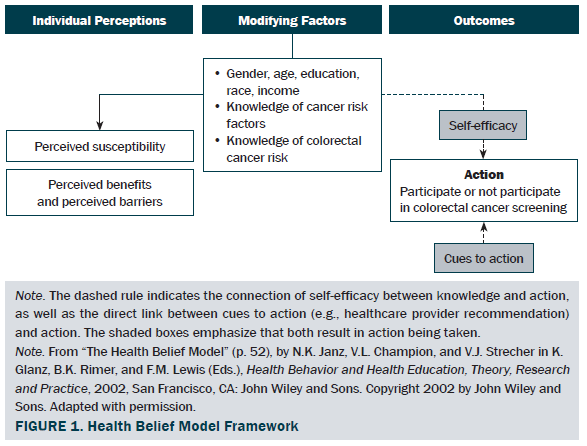
Methods
Participants
Phone surveys were conducted with 1,024 participants, of which 615 were aged 50 years or older. Among 947 participants who reported information about their race, about 77% identified as Caucasian, 19% identified as African American, less than 1% identified as either Asian or Hispanic,and 2% identified as other. Respondents had a mean age of 54.73 years (SD = 16.26), 52% were female, and 48% were male. For additional demographic information, see Table 2.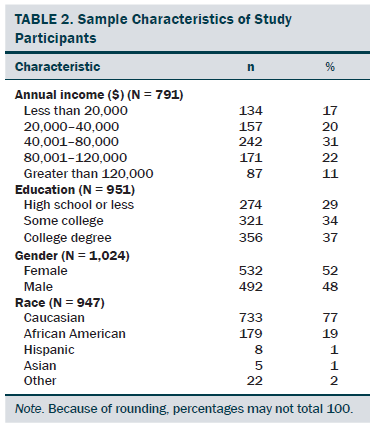
Procedure
The original data for this study was collected by the USA Polling Group in collaboration with the USA Department of Family Medicine with a grant from the University of South Alabama’s Abraham A. Mitchell Cancer Research Fund. The project was approved by the University of South Alabama’s institutional review board (IRB). Alabama residents were surveyed at random using standard random-digit–dialing procedures. Interviewers made contact with 6,032 eligible households, and a total of 1,024 interviews were completed, yielding a gross participation rate of 17%. The questionnaire included 80 questions: 26 general questions about health care, health policy, and cancer; 40 follow-up questions dealing specifically with CRC; and 14 demographic questions. The CRC questions were asked only of those respondents who reported being aged 50 years or older. This is the age group most at risk for CRC, as reflected in the screening recommendations of the U.S. Preventive Services Task Force and the ACS. Asking these follow-up questions only of those for whom they are most relevant helps to maximize survey efficiency and minimize incomplete surveys. Little is lost in this approach because the major aim of the survey was to inform efforts to increase screening for this at-risk age group. Data from the survey were obtained from the USA Polling Group and were used with permission from the primary investigator (Nicholls & Perkins, 2012). A research compliance request was approved by the University of Alabama’s IRB for the current authors to conduct a secondary analysis of the previously collected data.
Measures
The current authors investigated two primary measures selected from the survey related to the participants’ knowledge of cancer risk factors.
Knowledge of general cancer risk factors: All participants, regardless of age, were given a 12-item knowledge test of possible risk factors for cancer. Participants were asked, “Which of the following has been found to be a significant risk factor for cancer? In other words, which of these things increases a person’s chances of getting cancer?” Participants were then read 12 items (e.g., smoking cigarettes, cigars, or pipes; eating red meat; being overweight) and asked if each was a risk factor for cancer (see Figure 2). Of the 12 items, eight were actual risk factors and four were incorrect risk factors. Incorrect risk factors consisted of eating grilled vegetables, excessively exercising, drinking distilled water, and eating microwaved foods. The correct and incorrect totals were recorded by the interviewer without informing the participant if they were correct or incorrect.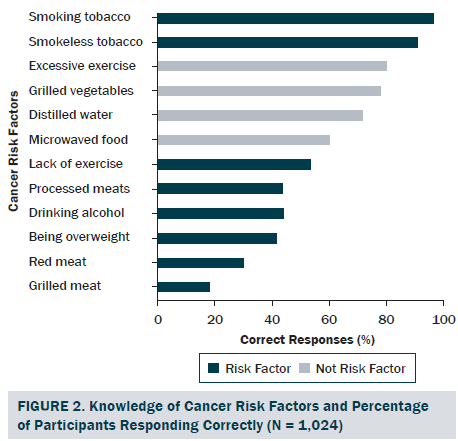
Knowledge of colorectal cancer risk factors: Participants aged 50 years or older were asked to list possible risk factors associated specifically with CRC. With this item, the participant was not prompted with choices but rather asked to think of them organically. Participants were asked, “Can you name any of the risk factors for CRC—that is, those things that might increase a person’s chances of getting CRC?” (see Figure 3). When finished, regardless of number listed, participants were prompted for additional risk factors. Each response given was recorded as correct or incorrect.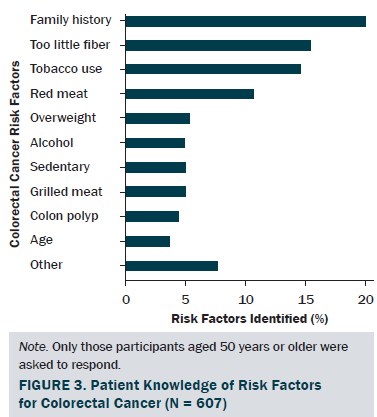
Outcomes: Several questions were selected as outcome variables that could presumably be linked to or result in knowledge of cancer risk factors. Some outcome variables were asked of the entire sample, whereas additional questions were asked of those who reported being aged 50 years or older. Two items were asked of all the participants: “What is the perception of your current health?” and “What is the perception of your future health five years from now?” The current authors also looked at agreement or disagreement with the statement, “There is nothing you can do to avoid getting cancer.” This variable is important because CRC can be avoided by finding and removing precancerous polyps. In addition, the risk of CRC is reduced by avoiding modifiable risk factors. The current authors also examined three items that were only asked of the group of participants aged 50 years or older. Those items included whether they had been screened for CRC, when they were last screened, and when they planned to get their next CRC screening.
Covariates: Several variables were investigated as potential covariates and/or predictors of cancer risk factor knowledge. Those items included perception of current healthcare quality, family history of cancer, age, education, race, and income.
Analysis
For this investigation, the current authors examined each of the knowledge variables separately. For each, linear regression was conducted with the cancer knowledge variable as the predictor variable and the different outcome variables as criterion. The current authors also used different covariates with linear regression and analysis of covariance to investigate what predetermined factors may influence cancer risk factor knowledge. During this investigation, several variables appeared to be related to risk factor knowledge. These variables were included to help further elaborate the model.
Results
Incidence of Screening
To understand how this sample related to other similar data sets reported, the current authors investigated the number of respondents who had reported being recommended to undergo screening. Physicians had recommended CRC screening to 65% of those aged 50 years or older. Of those who had been recommended screening, 91% reported they were likely to get that screening. Of those who were aged 50 years or older, 68% reported taking part in some type of CRC screening. When participants reported being recommended to get CRC screening, 81% said that they had been screened. For those who had not been recommended screening, only 19% had been screened. A significant chi-square test confirmed these differences (chi-square = 133.9, p < 0.001).
Knowledge of General Cancer Risk Factors
Out of a possible 12 correct answers, the mean for respondents was 7.58 correct answers (SD = 1.98). Linear regression with knowledge of general cancer risk factors as a predictor demonstrated a significant relationship with perception of current health (beta = 0.072, t[1020] = 2.31, p = 0.021) and perception of future health (beta = 0.08, t[1015] = 2.5, p = 0.013). In both instances, the greater number of risk factors known resulted in a more positive perception of current and future health. Greater knowledge of risk factors also predicted more disagreement with the statement, “There is nothing you can do to avoid getting cancer” (beta = –0.117, t[974] = –5.6, p < 0.001), suggesting that those with more knowledge of risk factors have a more accurate understanding of cancer avoidance.
No other selected outcome variables were significantly predicted by knowledge of general cancer risk factors. However, two additional variables of interest appeared during the analysis. Those who had higher knowledge of risk factors scored higher on a question asking, “How knowledgeable are you about the options available to you for cancer treatment?” (beta = 0.08, t[1014] = 6.75, p < 0.001). The second variable investigated was whether the participant saw a physician regularly. Binary logistic regression showed that those who knew of more risk factors were more likely to see a physician regularly (beta = 1.08, c2 = 9.31, p = 0.002). Neither of these variables can be considered true outcome variables because they may precede risk factor knowledge. Those who see a physician regularly may have more knowledge of risk factors from having been educated by their physician.
Level of education emerged as a primary significant predictor of knowledge of general cancer risk. Linear regression showed that level of education was the only significant predictor of knowledge of general cancer risk factors (beta = 0.2, t[951] = 6.17, p < 0.001). Race was also investigated as a factor that may cause differences in general cancer risk factor knowledge. A one-way analysis of variance with race as the independent variable and general risk factor knowledge as the dependent variable showed a significant difference (F[2,944] = 3.89, p = 0.021). Post hoc tests confirmed that Caucasian participants (mean = 7.7, SD = 1.97) demonstrated greater knowledge of risk factors compared to African American participants (mean = 7.31, SD = 1.89). In addition, this difference did not seem to be related to education; no significant differences were noted in levels of education between Caucasian and African American participants (F[4,936] = 1.15, p = 0.332).
Knowledge of Colorectal Cancer Risk Factors
Testing of knowledge of CRC risk factors was administered differently than testing for knowledge of general cancer risk factors. Respondents aged 50 years or older were asked to identify factors without prompting. Respondents offered a range of 0–10 risk factors and identified an average of 1.046 risk factors (SD = 1.43). The most common risk factors identified were family history (21%), too little fiber in the diet (16%), tobacco use (15%), and red meat consumption (12%). Only 5% of respondents mentioned colon polyps as a risk factor for CRC. Of the 10 correct responses most frequently offered, five were also found on the general knowledge test given previously. However, participants were not told whether their responses were correct or incorrect on the previous test, so overlap should mostly have been mitigated.
Linear regression with knowledge of CRC risks as the predictor variable demonstrated a significant relationship with the participant’s current perception of health (beta = 0.11, t[571] = 2.68, p = 0.008). The more risk factors that participants were able to name, the more positively they perceived their current health. Knowledge of CRC risk factors also predicted disagreement with the statement, “There is nothing you can do to avoid getting cancer” (beta = –0.12, t[543] = –2.85, p = 0.005) and disagreement with the statement, “Only people with signs or symptoms should be screened for CRC" (beta = –0.15, t[560] = –3.54, p < 0.001). These two findings appear to be of the utmost importance in relation to CRC screening. Those who know about the possible risk factors are more likely to have a proactive mindset and realize that being screened for cancer before symptoms appear is important. Binary logistic regression showed that those higher in CRC risk knowledge were more likely to have been screened for CRC (beta = –0.39, c2 = 6.67, p = 0.01). Once again, the current authors exercise caution with this variable because going through the process of CRC screening resulted in increased knowledge of the risk factors.
Education was the primary significant predictor of CRC risk factor knowledge (beta = 0.18, t[536] = 4.34, p < 0.001). Other variables (e.g., race, income, family history) were not significant. Knowledge of general risk factors predicted knowledge of CRC risk factors (beta = 0.27, t[571] = 6.66, p < 0.001). General knowledge in an area may be predictive of knowledge in a similar specialized context; however, the difference is enough to suggest discriminate validity.
Discussion
Although overall CRC incidence rates have declined, primarily because of CRC prevention, the removal of precancerous tumors or polyps, and changes in modifiable risk factors (NCI, 2014; Siegel et al., 2015), Alabama screening rates remain lower than the Healthy People 2020 target of 71% or the Alabama Department of Public Health and ACCCC CRC screening goal of 80%. CRC is highly treatable if found early and is often preventable though the identification and removal of polyps. However, disparities continue to exist.
Overall, about 68% of Alabamians aged 50 years or older are current with CRC screening. Broad local, state, and national partners have a common goal of increasing CRC screening rates to 80% among those aged 50 years or older by 2018. The literature suggests a usual source of health care and recommendations from a healthcare provider as facilitators of CRC screening participation. In the current study, 68% of those aged 50 years or older reported participating in some type of CRC screening, which corroborates with the previously reported statistical data. Among participants in the current study who had not been recommended screening, only 19% had been screened. These results further suggest the importance of healthcare provider screening recommendations. Exploring healthcare provider cancer screening recommendations and developing interventions to address patient–provider communication may be warranted.
General Cancer Knowledge
In the current study, using knowledge of general cancer risk factors as a predictor demonstrated a significant relationship to perception of current and future health. The greater number of known risk factors was associated with a more positive perception of current and future health. In addition, greater knowledge of risk factors also predicted more disagreement with the statement, “There is nothing you can do to avoid getting cancer,” suggesting that those with more knowledge of risk factors have a more accurate understanding of cancer prevention. Those who had higher knowledge of risk factors also scored higher on a question asking, “How knowledgeable are you about the options available to you for cancer treatment?” These findings suggest that improving cancer knowledge should be an important component of efforts to increase CRC screening. McKinney and Palmer (2014) similarly concluded in their study about CRC that knowledge influenced screening behavior. They further suggested that improving understanding about a particular disease leads to greater perceived risk for disease development and motivates individuals to screen (McKinney & Palmer, 2014). Consequently, interventions geared toward educating communities at risk about cancer risk factors could positively affect screening rates and decrease disparities, particularly among underserved populations.
In addition, those who knew of more risk factors were more likely to see a physician regularly. Although those who see a physician regularly would likely have more knowledge of risk factors, implications exist for others in the community who do not have a regular healthcare provider. A general move to facilitate the provision of more community-based education to reach those who lack a usual source of care may contribute to increasing CRC screening rates.
In this study, the current authors found that Alabama’s minority population displayed lower levels of general cancer care knowledge compared to Caucasian individuals. Previous work has shown that minority and rural populations have an overall higher burden of cancer disparity in regard to incidence and mortality (ACCCC, 2010). These results partially suggest that knowledge of risk factors may account for part of this disparity. This difference did not seem to be related to education, and no difference was found between races in highest level of education completed. This finding is similar to Guessous et al. (2010) and provides an important rationale for directing efforts to enhance cancer-related education toward African American communities.
Colorectal Cancer Knowledge
Knowledge of CRC risk factors also predicted disagreement with the statement, “There is nothing you can do to avoid getting cancer,” and disagreement with the statement, “Only people with signs or symptoms should be screened for CRC.” Analysis showed that those higher in CRC risk knowledge were more likely to have been screened for CRC. Knowledge of risk factors could result in individuals being more proactive about their health, with an overall increase in awareness and prioritizing the importance of being screened for cancer. This further supports the current authors’ belief that improving cancer-related education is a critical ingredient in efforts to increase the CRC screening rate.
Limitations
The primary limitation of this study is that this is a secondary data analysis, with the data recorded simultaneously. Therefore, true causality between the variables cannot be established. In addition, findings are based on self-reported data. Although no reason exists to suspect that respondents would be untruthful in this anonymous survey, incidences of misremembering or incorrect information may be present. In addition, multiple variables feature the “chicken-or-the-egg” problem; telling whether knowledge influences going to a physician or whether going to a physician increases knowledge is impossible. In all likelihood, the relationship is reciprocal, further complicating the elaboration of findings. Another limitation is the overlap in items between general cancer risk factors and specific CRC risk factors. Some of the answers to the CRC knowledge test could have been hypothesized based on the previous quiz, even though participants were never told which of their answers were correct. In addition, the uncertainty of the actual CRC risk level of participants is a limitation; consequently, this study cannot make conclusions regarding risk.
Implications for Nursing
Nurses and other healthcare providers play an essential role in developing and providing interventions geared toward educating individuals and communities about CRC cancer, risk factors, and screening. This study suggests and supports previous literature indicating that higher CRC risk knowledge and recommendations from a healthcare provider are associated with the likelihood of being screened for CRC. In accordance with the Health Belief Model (Janz et al., 2002), an increase in CRC knowledge risk factors leads to increased CRC screening participation. Increasing CRC risk and prevention knowledge in the public to increase screening rates seems to be imperative. This emphasis is particularly important in communities that are underserved or have high populations of groups that have demonstrated decreased knowledge in cancer risk factors. Several options for CRC screening exist, and this may be confusing to some in communities in which many options are available and individuals lack knowledge of which option they should pursue. Available resources, finances, cultural influences, education, knowledge, and awareness among a population may all affect screening participation.
In addition, interventions focused on increasing CRC education about risk factors and screening should be specifically tailored to the community by using a community-based participatory approach that includes alternative methods to promote the benefits of CRC detection and screening (e.g., health information related to the potential of decreasing CRC morbidity and mortality by finding and removing polyps and diagnosing cancer early through broad-based screening).
Nurses are instrumental in increasing interventions in the practice and community settings to address CRC knowledge and awareness. Within practice, nurses may consider advocating for using nurse educators in the clinical setting who could provide individualized and culturally relevant health information with fewer time constraints. Incorporating reminders within health information systems may be beneficial for healthcare providers and patients to ensure cancer screening information is shared. Community interventions are essential in reaching those at increased risk and who may lack a usual source of health care.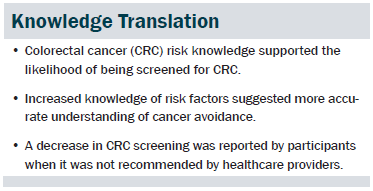
Conclusion
Previous work has shown that screening for CRC has been proven to decrease the morbidity and mortality associated with this disease. A significant need exists to increase participation in CRC screening among Alabamians. Based on the Health Belief Model (Janz et al., 2002), the expectation that an increase of knowledge would increase the chance of action toward CRC screening participation is reasonable. Because of that, additional interventions geared toward increasing CRC awareness and knowledge of risk factors, particularly among members of underserved communities and minority populations, may increase screening rates.
Interventions that include forms of social support may be advantageous for individuals and groups, such as churches and other community organizations. Public service announcements using television, radio, and social media may further assist in reaching individuals who are at increased risk of CRC morbidity and mortality. In all, nurses are in a position to affect knowledge and awareness related to CRC, a preventable and treatable health issue.
References
Alabama Comprehensive Cancer Control Coalition. (2010). The path to cancer control in Alabama: A comprehensive plan. Retrieved from http://www.adph.org/cancercontrol/assets/ACCCC2011Plan2.pdf
Alabama Statewide Cancer Registry. (2014). Late stage colorectal cancer diagnoses 2007 to 2011. Retrieved from http://www.adph.org/ascr
American Cancer Society. (2013). Cancer facts and figures for African Americans 2013–2014. Retrieved from http://www.cancer.org/acs/groups/content/@epidemiologysurveilance/docum…
American Cancer Society. (2015a). What are the key statistics about colorectal cancer? Retrieved from http://www.cancer.org/cancer/colonandrectumcancer/detailedguide/colorec…
American Cancer Society. (2015b). What are the risk factors for colorectal cancer? Retrieved from http://www.cancer.org/cancer/colonandrectumcancer/detailedguide/colorec…
American College of Gastroenterology. (2015). Clinical guidelines (sortable list). Retrieved from http://gi.org/clinical-guidelines/clinical-guidelines-sortable-list
Centers for Disease Control and Prevention. (2012, January 27). Cancer screening—United States, 2010. Morbidity and Mortality Weekly Report, 61, 41–45.
Centers for Disease Control and Prevention. (2014). Behavioral Risk Factor Surveillance System Survey data. Retrieved from http://www.cdc.gov/brfss/annual_data/annual_2014.html
Chan, A.T., & Giovannucci, E.L. (2010). Primary prevention of colorectal cancer. Gastroenterology, 138, 2029–2043. doi:10.1053/j.gastro.2010.01.057
Ferrari, P., Jenab, M., Norat, T., Moskal, A., Slimani, N., Olsen, A., . . . Riboli, E. (2007). Lifetime and baseline alcohol intake and risk of colon and rectal cancer in the European prospective investigations into cancer and nutrition (EPIC). International Journal of Cancer, 121, 2065–2072. doi:10.1002/ijc.22966
Griffith, K.A., Passmore, S.R., Smith, D., & Wenzel, J. (2012). African Americans with a family history of colorectal cancer: Barriers and facilitators to screening. Oncology Nursing Forum, 39, 299–306. doi:10.1188/12.ONF.299-306
Guessous, I., Dash, C., Lapin, P., Doroshenk, M., Smith, R.A., & Klabunde, C.N. (2010). Colorectal cancer screening barriers and facilitators in older persons. Preventive Medicine, 50, 3–10. doi:10.1016/j.ypmed.2009.12.005
Hampel, H., Frankel, W.L., Martin, E., Arnold, M., Khanduja, K., Kuebler, P., . . . de la Chapelle, A. (2008). Feasibility of screening for Lynch syndrome among patients with colorectal cancer. Journal of Clinical Oncology, 26, 5783–5788. doi:10.1200/JCO.2008.17.5950
Janz, N.K., Champion, V.L., & Strecher, V.J. (2002). The Health Belief Model. In K. Glanz, B.K. Rimer, & F.M. Lewis (Eds.), Health behavior and health education, theory, research and practice (pp. 45–66). San Francisco, CA: John Wiley and Sons.
Klabunde, C.N., Schenck, A.P., & Davis, W.W. (2006). Barriers to colorectal cancer screening among Medicare consumers. American Journal of Preventive Medicine, 30, 313–319. doi:10.1016/j.amepre.2005.11.006
McKinney, S.Y., & Palmer, R.C. (2014). The influence of gender on colorectal cancer knowledge, screening intention, perceived risk and worry among African Americans in South Florida. Journal of Community Health, 39, 230–238. doi:10.1007/s10900-013-9812-8
National Cancer Institute. (2014). A snapshot of colorectal cancer. Retrieved from http://www.cancer.gov/researchandfunding/snapshots/colorectal
National Cancer Institute. (2015). Colorectal cancer screening—For health professionals (PDQ®). Retrieved from http://www.cancer.gov/types/colorectal/hp/colorectal-screening-pdq
Nicholls, K., & Perkins, A. (2012). Colorectal cancer screening in Alabama: Public perceptions and practices. A telephone survey of Alabama residents. Unpublished manuscript.
Prochaska, J.O., & DiClemente, C.C. (1984). The transtheoretical approach: Crossing traditional boundaries of therapy. Homewood, IL: Dow Jones-Irwin.
Rex, D.K., Johnson, D.A., Anderson, J.C., Schoenfeld, P.S., Burke, C.A., & Inadomi, J.M. (2009) American College of Gastroenterology guidelines for colorectal cancer screening 2009. American Journal of Gastroenterology, 104, 739–750. doi:10.1038/ajg.2009.104
Shim, M., Kelly, B., & Hornick, R. (2006). Cancer information scanning and seeking behavior is associated with knowledge, lifestyle choices, and screening. Journal of Health Communication, 11(Suppl. 1), 157–172. doi:10.1080/10810730600637475
Siegel, R.L., Miller, K.D., & Jemal, A. (2015). Cancer statistics, 2015. CA: A Cancer Journal for Clinicians, 65, 5–29. doi:10.3322/caac.21254
Steele, C.B., Rim, S.H., Joseph, D.A., King, J.B., & Seeff, L.C. (2013, November 22). Colorectal cancer incidence and screening—United States, 2008 and 2010. Morbidity and Mortality Weekly Report. Surveillance Summaries, 62(Suppl. 3), 53–60.
U.S. Department of Health and Human Services. (2014). 2013 national healthcare disparities report. Retrieved from http://www.ahrq.gov/sites/default/files/wysiwyg/research/findings/nhqrd…
U.S. Preventive Services Task Force. (2015). Colorectal cancer: Screening. Recommendation summary. Retrieved from http://www.uspreventiveservicestaskforce.org/Page/Topic/recommendation-…
World Health Organization. (2008). World cancer report 2008. Retrieved from http://www.iarc.fr/en/publications/pdfs-online/wcr/2008/wcr_2008.pdf
About the Author(s)
Oliver is an associate professor in the Capstone College of Nursing at the University of Alabama in Tuscaloosa; Ewell is an assistant professor in the Department of Psychology at Kenyon College in Gambier, OH; Nicholls is an associate professor in the Department of Political Science and Criminal Justice at the University of South Alabama and associate investigator at the Mitchell Cancer Institute, both in Mobile; Chapman is the director of the Cancer Prevention Branch of the Alabama Department of Public Health in Montgomery; and Ford is the medical director at Internal Medicine Affiliates in Birmingham, AL. No financial relationships to disclose. Oliver, Ewell, Nicholls, Chapman, and Ford contributed to the conceptualization and design, analysis, and manuscript preparation. Oliver, Ewell, and Nicholls completed the data collection. Ewell and Nicholls provided statistical support. Oliver can be reached at joliver@ua.edu, with copy to editor at ONFEditor@ons.org. Submitted November 2014. Accepted for publication May 14, 2015.

